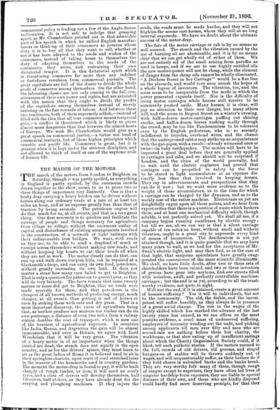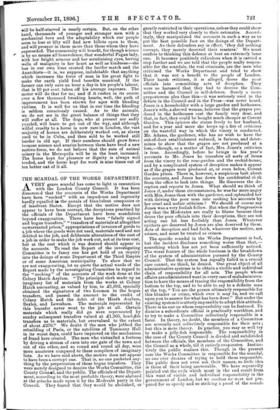THE MARCH OF THE MOTORS. T HE march of the motors
from T•ondon to Brighton on Saturday, though it was partly spoiled, as everything in England is partly spoiled, by the enormous crowds drawn together to the show, seems to us to prove two or three things of importance very distinctly. One is that a heavy dray carrying a heavy burden can be driven without horses along our ordinary roads at a rate of at least ten miles an hour, and at an expense greatly less than that of traction by living animals. The petroleum engine will do that much for us, at all events, and that is a very great thing. Our first necessity is to quicken and facilitate the carriage of people and things necessary for agriculture from village to village, without the enormous outlay of capital and disturbance of existing arrangements involved in the construction of a network of light railways with their indispensable iron bridges. We want, with roads as they are, to be able to send a drayload of muck or turnips across Greenshire without making new roads, and without keeping big beasts to eat their heads off when they are not at work. The motor clearly can do that, can run up and walk down steepish hills, can be repaired at a blacksmith's forge, and can carry its own food, petroleum, without greatly increasing its own load. It does not matter a straw how many cars failed to get to Brighton. That is only a question for patentees to quarrel over, as they will do very bitterly. The facts remain that some twenty motors or more did get to Brighton, that no roads were made specially for them, and that petroleum is the cheapest of all known methods of producing energy, much cheaper, at all events, than getting it out of horses or oxen by stoking them with oats and dry grass. That is a most important discovery, the curse of agriculture being that, as neither produce nor manure nor timber can do its own porterage, a, distance of even two miles from a railway station doubles the cost of transport, which is now one of the heaviest of agricultural expenses. In countries like India, Russia, and Argentina the gain will be almost immeasurable, and even in Britain, we agree with Lord Winchilsea that it will be very great. The vibration of a heavy motor is of no importance when the things carried are dead, the stench does not signify in the open country, and as for the drivers' spines, they must learn to sit as the great ladies of Rome it is believed used to sit in their springless chariots, upon seats of cord stretched loose in the manner of the hammocks used in country gardens. The moment the motor-dray is found to pay, it will be built -cheaply of rough timber, or iron, it will need no costly tyres, and a class of drivers will develop themselves, half labourers, half stukers, as they have already done for the reaping and ploughing machines. If they injure the roads, the roads must be made harder, and they will not frighten the serene cart-horses, whom they will at no long interval supersede. We have no doubt about the ultimate success of the motor-dray.
The fate of the motor carriage or cab is by no means so well assured. The stench and the vibration caused by the use of burning oil are abominable, and it is by no means clear that we can get wholly rid of either of them. We are not entirely rid of the smell arising from paraffin as used in lamps, and if we are to use highly rectified oils the new motive-power will not be cheap, while the element of danger from the cheap oils cannot be wholly eliminated. " A Duchess Burnt in her Carriage" would be a fine line on the placards, and would very soon smash the hopes of a whole legion of inventors. The vibration, too, and the noise seem to be inseparable from the mode in which the power generated expends itself. Nor is the difficulty of using motor carriages while horses still survive to be summarily pushed aside. Many horses, it is clear, will pay no attention to their new danger, but many others will, and the scene in Regent Street on a winter's evening, with half-a-dozen motor-carriages puffing out shining smoke, and half-a-dozen horses rushing madly through the crowd, may be too like Pandemonium to be tolerated even by the English pedestrian, who is so serenely indifferent to bicycles, overhead wires, and the chance that the underground cables may strike up an acquaintance with the gas-pipes, with a result—already witnessed once or twice—in baby earthquakes. The motors will have to be improved a great deal before they are generally applied to carriages and cabs, and we should not be surprised if London, and the cities of the world generally, had to wait until the electric engineers had proved that carriages can be propelled in safety by the force to be stored in light accumulators at an expense dis- tinctly less than that involved in keeping horses. They say in advertisements and prospectuses that they can do it now ; but we want more evidence as to the weight of those accumulators, as to the time for which a carriage can be charged by the dynamos, and as to the weekly cost of the entire machine. Electricians as yet are delightfully vague upon all these points, and we hear from expert critics that there is a question of waste which bothers them, and at least one mechanical difficulty which, though soluble, is not perfectly solved yet. We shall all see, if a company begins running omnibuses by electric energy ; but till we see, all we can say is that a silent carriage capable of ten miles an hour, without smell and without vibration, ought in a great city to supersede every kind of means of locomotion. The desideratum is not yet attained though, and it is quite possible that we may have many years to wait, as we had for the acceptance of Mr. Swan's electric light, and may then find, as in the case of that light, that sanguine speculators have greatly exag- gerated the convenience of the more scientific illuminator. We shall, we have little doubt, after two or three sets of shareholders have been ruined, and two or three inventors of genius have gone into asylums, find our streets filled with noiseless, swift, and perfectly controllable machine- carriages ; but the end is as yet, according to all the trust- worthy evidence, not quite in sight.
Will not the end, if it is attained, create a great amount of human suffering ? Yes it will to individuals, but not to the community. The old, the feeble, and the incom- petent will suffer horribly, as they always do in presence of a great social change. The rise in the wages of the highly skilled which has marked the advance of the last twenty years has caused, as we can affirm on the most positive evidence, a cruel mass of undeserved suffering, employers of necessity weeding out the unfit, and picking among applicants till men over fifty and men who are second-rate see nothing before them but charity, the workhouse, or that slow eating up of insufficient savings about which the Charity Organisation Society could, if it liked, tell such pathetic stories. If the motors succeed to the full, crowds of old drivers, old grooms, and stupid hangers-on of stables will be thrown suddenly out of wages, and will unquestionably suffer, as their betters do if they hold shares in unlimited banks and the banks break. They are very worthy folk many of them, though rough of tongue except to superiors, they have often led lives of singular hardship from exposure, they are liable to special diseases of their own, and those who are kindly disposed could hardly find more deserving prot6ges, for that they will be half-starved is nearly certain. But, on the other hand, thousands of younger and stronger men with a mechanical turn and the adaptability which our people seem to lose at fifty will find new billets open to them, and will prosper in them more than those whom they have superseded. The community will benefit, for though science is by no means all benevolence, that wonderful Pagan lady, with her bright armour and her scrutinising eyes, having wells of malignity in her heart as well as kindness—she has in our own time created the lucifer match and the Anarchists—it is, we suppose, indubitable that anything which increases the force of man in his great fight to make the earth yield food benefits mankind. If the farmer can only save an hour a day in his people's labour, that is 10 per cent. taken off his average expenses. The motor will do that for us ; and if it rushes in its course over a few thousand breaking hearts, well, the path of improvement has been strewn for ages with bleeding victims. It is well for us that in our time the bleeding is seldom consciously caused. As to the animals, we do not see in the great balance of things that they will suffer at all. The dogs, who at present are sadly puzzled, will learn to get out of the way, and although wilful cruelty to a horse is now rare in London, the vast majority of horses are deliberately worked out, as slaves used to be in Cuba, and then sold to be worked still harder in old age. If their numbers should grow fewer because science and avarice between them have bred a new motive-force, we do not believe that the sum of animal misery in the Metropolis will be in the least increased. The horse kept for pleasure or dignity is always well tended, and the horse kept for work is nine times out of ten better out of it all.























































 Previous page
Previous page